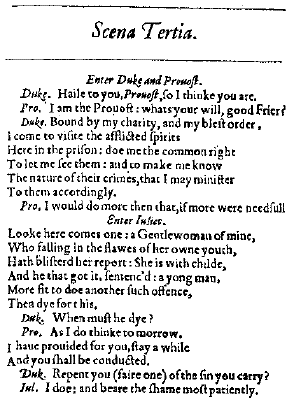|
|
DUKE.
Hail to you, Provost, so I think you are.
|
|
|
|
PROVOST.
I am the Provost: What's your will, good friar?
|
|
|
|
DUKE.
Bound by my charity, and my blest order,
I come to visit the afflicted spirits
Here in the prison: do me the common right
To let me see them: and to make me know
The nature of their crimes, that I may minister
To them accordingly.
|
|
|
|
PROVOST.
I would do more than that, if more were needful
|
|
|
|
Look here comes one: a gentlewoman of mine,
Who falling in the flaws of her own youth,
Hath blisterd her report: she is with child;
And he that got it, sentenced: a young man,
More fit to do another such offence,
Than die for this.
|
|
|
|
PROVOST.
As I do think to morrow.
I have provided for you, stay awhile
And you shall be conducted.
|
|
|
|
DUKE.
Repent you (fair one) of the sin you carry?
|
|
|
|
JULIET.
I do; and bear the shame most patiently.
|
|
|
 |
